
Animals
Weird? These bat toes can glow greenish-blue
Hairy bristles on the toes of Mexican free-tailed bats fluoresce under UV light. The reason is a mystery.
By Jason Bittel
Come explore with us!

Hairy bristles on the toes of Mexican free-tailed bats fluoresce under UV light. The reason is a mystery.

From reindeer that snooze while chewing to penguins that take thousands of naps each day, the animal kingdom has some truly weird sleep patterns.

The extinct megalodon (Otodus megalodon) was the largest shark to ever prowl the oceans.

Your dog is wagging its tail. That must mean it’s happy, right? Maybe not. Scientists know less about what’s behind this behavior than you might think.

Understanding the genetic adaptations that protect the birds’ brains as they dive might one day offer clues to protecting human brains.

The reptiles’ horns could help or hinder during foraging, depending on how they hunt. This might be why horns evolved in some species and not others.

O. megalodon sharks were warm-blooded mega-predators. But when food sources dwindled, colder-blooded sharks may have had an evolutionary edge.

The difference between a dog and a wolf isn’t looks or genes or even behavior. It’s the relationship these animals have with people.

Pokémon “evolve” into larger, more powerful forms within seconds, but this evolution more closely resembles another biological process — metamorphosis.

Glass frogs snoozing among leaves blend in by hiding almost all their red blood cells in their liver.